Mamoun al-Bustani | Diana Rahima | Khaled al-Jeratli | Hussam al-Mahmoud
Two international axes control the Syrian file, and one is almost swallowing the other. The first is represented by the guarantors of the Astana track, namely Russia, Turkey, and Iran, while the second axis includes the supporters of the political process in the Geneva peace talks headed by the United States and its allies.
The first axis is working to expand its presence in Syria at the expense of the second axis through political activity, the latest of which was the meeting of Turkish President Recep Tayyip Erdogan and his Russian counterpart, Vladimir Putin, in the Russian city of Sochi on 5 August.
The meeting of the Russian and Turkish presidents was preceded by a summit that brought them together in the Iranian capital, Tehran, with Iranian President Ebrahim Raisi, and it was a political stress on a bloc that brings together the three countries and confirms the Astana process exclusively on the Syrian arena.
On the other hand, the American-Arab Jeddah Security and Development summit, which was held on 16 July, and which brought together the US President, Joe Biden, with the leaders of nine Arab countries, did not witness a large space to talk about Syria, as the Syrian issue was timidly mentioned by a number of Arab leaders which did not carry any change.
In this file, Enab Baladi discusses, with researchers and specialized academics, the political movements of the active forces in Syria, the military changes on the ground, the regional and international rush in exchange for other forces’ withdrawal from the Syrian issue and its impact on Syria’s future paths of a solution.
In hard times, Syrian people have no friends
Last July, the UN Special Envoy for Syria Geir Pedersen announced the cancellation of the date of the ninth round of the Syrian Constitutional Committee meetings, which was scheduled from 25 to 29 of the same month.
The co-chair of the Constitutional Committee, Hadi al-Bahra, announced that Pedersen informed him in an official letter of the postponement of the round of talks “because the joint co-chair nominated by the government of the Syrian Arab Republic notified him that his delegation will be ready to participate in the ninth session only when what he described as the requests submitted by the Russian Federation are met.”
On 16 June, the Russian President’s special envoy to Syria, Alexander Lavrentiev, indicated the cities that could host the meetings of the Syrian Constitutional Committee instead of the Swiss Geneva, suggesting three Arab capitals (Muscat, Abu Dhabi, and Algiers).
Astana weakens Geneva
The Syrian-Canadian academic Faisal Abbas Mohammad, who holds a doctorate in Middle Eastern studies from Canada, told Enab Baladi that Russia’s demand to change the venue of these negotiations reflects a malicious position directed against Europe.
It is a position that has more to do with formality than with content or course, and the venue will not affect much negotiations that are basically futile, as the eight “comic” sessions have proven so far, Mohammad adds.
Hadi al-Bahra had previously responded to Enab Baladi about whether the course of the Constitutional Committee would be fruitful in the near future and the Syrian opposition’s continued dependence on and adherence to it by saying, “We are fully aware that the Constitutional Committee is only an essential part and an entry point to the political process, and it is not in any way a shorthand for it.”
No friends for Syrian people
Regarding the recent meeting of the “Friends of Syria” group that took place in Washington on 3 March, academic Faisal Mohammad believes that it shows a lack of seriousness and effectiveness in dealing with the Syrian file, with the exception of dealing with the humanitarian aid file.
On 3 March, representatives of a number of Arab and Western countries said, after a meeting in the United States, that they welcomed the briefing given by Geir Pedersen during the meeting, including the “step-for-step process.”
This came in a statement published by the US State Department, following a meeting attended by representatives of the Arab League, Egypt, the European Union, France, Germany, Iraq, Jordan, Norway, Qatar, Saudi Arabia, Turkey, Britain, and the United States, in addition to Pedersen.
Academic Mohammad believes that the participants’ welcoming of the (step-for-step) argument that Pedersen is promoting to make progress in the Syrian “political process” indicates political short-sightedness or keeping the ball in the court of the UN, or it indicates both and that this will not change unless the US, which is the most influential country in this group, ends its apathy towards the Syrian issue.
Pedersen depicts the approach he is talking about, which is manifested in the presence of an American-Russian rapprochement with the Syrian file, which is the cornerstone of his approach, that it is still in the stage of brainstorming, and that there are additional rounds of consultations, but the steps for rapprochement between the two countries have not started now.
|
Friends of Syria Group Friends of the Syrian People Group is an international diplomatic collective of countries and bodies convening periodically on the topic of Syria outside the UN Security Council. Its role declined with the control of the Russian-backed regime over large areas in Syria, and the political track shifted to the Astana rounds, which are guaranteed by Russia, Turkey, and Iran, as an alternative path to Geneva peace talks. |
The factors that were mentioned make the Astana process capture the spotlight at the expense of all those concerned with the Syrian issue, noting that this track is nothing more than a framework for managing the differences between the main players on the Syrian ground (Russia, Iran, and Turkey), and was never concerned with providing a political way out of the Syrian Holocaust, according to Dr. Faisal Mohammad.
“The political process in Syria was basically born dead,” according to the academic, who considered that a political solution to the conflict in Syria requires a balanced international intervention that presupposes a minimal consensus between the major powers, which does not exist, not only because of the Russian and Chinese vetoes but also because of the indifference of the EU and the US.
Accordingly, the Syrian political process will remain frozen within these circumstances and held between two axes (Friends of Syria and Astana guarantors).
The first is ineffective so far, and the second collides with the fact that two out of the three players, Russia and Iran, have no interest in a political solution in Syria because it means the end of a regime that is the main pillar of their influence in the Arab region.
US eyes Iran’s oil and nuclear files
American recoil from Syrian issue
The Middle Eastern visit of US President Joe Biden last July, during which he met with Washington’s allies in the region, showed clear evidence that Washington no longer adheres to the Syrian file and how the Biden administration’s stance away from Syria politically and militarily.
Between the 13 and 16 of July, the Syrian file was almost absent during Biden’s presence in Israel, and it was mentioned briefly during Biden’s meeting with some Arab leaders at the “Jeddah for Security and Development” summit in Saudi Arabia.
Absence, presence
In contrast to the absence of the Syrian file from Biden’s portfolio during his first tour in the Middle East since he took office in December 2020, the Iranian nuclear file and the oil file were strongly present, and they are the declared goal of the visit.
Dr. Zaki Lababidi, the president of the Syrian American Council, told Enab Baladi that the current US administration’s interest in the Syrian file has declined significantly and considered that the Biden administration is not interested in finding a solution to Syria.
The Biden administration announced, a few months after assuming his position, that it was conducting a study to come up with a strategy on Syria, but after the study took about a year, the administration came up with a strategy that was limited to two main points, namely focusing on the delivery of humanitarian aid and fighting terrorism, Lababidi added.
Although the delivery of humanitarian aid was a top US priority towards Syria, Washington was unable to renew the mechanism for entering aid across the border for a year, as the period was reduced to six months under pressure from Russia, which wants to deliver aid through the Syrian regime across the contact lines.
Internal and external reasons
The decline in American interest in the Syrian file is due to the internal situation in the United States and to many internal and external problems, the most important of which are the Covid-19 epidemic, financial inflation, and the confrontation of the Chinese-Russian alliance, as well as the energy crisis, the president of the Syrian American Council, said.
“The decline of the US interest is linked to internal matters and the improvement of the American citizen’s livelihood,” according to Lababidi, noting that “regarding the global geopolitical situation, Syria has become a secondary issue after the Russian invasion of Ukraine, and the West’s fear that Russian President Vladimir Putin will win his war on Ukraine, which threatens all the countries of Eastern Europe that were under the domination of the Soviet Union.”
All these reasons came against the interests of the Syrians, the latest of which was the tension between America and China due to the visit of the US House of Representatives Speaker, Nancy Pelosi, to Taiwan, which led to China conducting major military maneuvers, preoccupying American political and military leaders, Lababidi concluded.

The co-chair of the Syrian Constitutional Committee, Hadi al-Bahra, attends the meetings of the Syrian Constitutional Committee in Geneva – 27 January 2020 (Violin Martin / United Nations)
For whom is the US abandoning Syria?
The Washington Post’s columnist Josh Rogin on 20 July said, “President Biden’s trip to the Middle East the week before showed that his administration has abandoned any pretense of US leadership on addressing the crisis in Syria.”
Adding, “That policy of neglect undermines the US and regional interests — and threatens to leave the region’s security in the hands of Russia and Iran.”
Biden never mentioned Syria publicly during his four-day trip, which was billed as a demonstration of US engagement in a region where powers such as Russia and China are making inroads, Rogin said.
According to The Washington Posts’ columnist, the president did not come up with any new ideas for solving the Syrian political crisis. He did not offer any public admonishments to the Gulf countries that have been slowly but surely ending the pariah status of Bashar al-Assad, who continues to perpetrate mass atrocities on his people. In Biden’s Post op-ed explaining the rationale for his Middle East trip, he only mentioned Syria to tout a US mission that killed a terrorist there.
Leading from behind
Bassam Barabandi, a Washington-based former Syrian diplomat and the co-founder and director of external relations of People Demand Change, said that “the decline in American interest in the Syrian file and the Middle East is not new.”
This started in the era of former US President Barack Obama, who launched the slogan (leading from behind), meaning that regional countries are the ones who can solve the crises in them, while America supports its allies from behind without any interference, he added.
Barabandi added that “it has been clear since the Obama era of the change in US foreign policy, as the focus has been on two issues only, the first is the competition with China to limit its political, military and economic growth, and the second is building and strengthening the US domestic economy.”
The foreign policy that continued during the administration of former US President Donald Trump and the current administration was accompanied by the withdrawal of military forces, easing their presence, or establishing a military alliance with the countries of the region, according to Barabandi.
The former diplomat believes that Syria paid the highest price for the US policy of retreat. While Washington was negotiating with Tehran on the nuclear file in 2015, Iran was expanding in Syria until Trump came and imposed sanctions on Iran, and Washington withdrew from the nuclear agreement in 2018.
Barabandi considered that “Trump was more clear and blunt in expressing the American policy towards Syria when he openly said that Washington has no interests in Syria, announcing the withdrawal of American forces before he retreated and kept part of it.”
The Syrian politician stated that the turning point in US policy towards Syria became clear during the Trump era when it was reduced to three issues: the ceasefire, the fight against terrorism, and the entry of humanitarian aid.
While the Biden administration followed the path of its predecessor, it was weaker and also focused on a ceasefire, humanitarian aid, and preventing the revival of the Islamic State group, he added.
Russia’s Bogeyman and Iran’s Nuclear
Since the start of the Russian war on Ukraine on 24 February, the White House has announced its support for Kyiv in the face of Russian forces, and in addition to the military and material support it has provided to Ukraine, the Biden administration is working to support the accession of new countries to NATO.
On 3 August, the US Senate overwhelmingly approved the accession of Sweden and Finland to NATO, making the United States the 23rd member of the alliance to ratify the accession of the two Scandinavian countries since the ratification process was launched on 5 July, after the two countries submitted an official request to join last May.
The Senate approval was the fastest since 1981, which made US President Joe Biden laud it, issuing a statement in which he said, “This historic vote sends an important signal about the United States’ continued bipartisan commitment to the (NATO) alliance, and to ensuring that our alliance is on prepare to face the challenges of today and tomorrow.”
In a separate context, Washington is preparing to resume negotiations on reviving the Iranian nuclear agreement in the Austrian capital, Vienna, after negotiations have been suspended since last March.
On 3 August, the US Special Envoy for Iran, Robert Malley, announced that he was preparing to travel to Vienna to hold talks on the Iranian nuclear program.
Malley noted that expectations from the negotiations “are under scrutiny, but the US welcomes the efforts of the EU and is ready to sincerely try to reach an agreement.” It will soon become clear whether Iran is ready for this.”
The US announcement was followed by Tehran’s announcement that the Iranian delegation participating in the nuclear agreement negotiations would leave the country for Vienna to resume these negotiations.
Iranian Foreign Ministry spokesman, Nasser Kanaani, said that this round will take place similar to its predecessors, coordinated by the EU, and will be similar to the indirect Doha talks, which were facilitated by Enrique Mora, European Coordinator for Negotiations, and the Deputy Secretary General of the European External Action Service.
More than 11 years after the start of the Syrian revolution, Syrians are divided over the most influential foreign forces in Syria, both militarily and politically.
This division is, to some extent, evidenced by the results of an opinion poll conducted by Enab Baladi on its website about who influences the Syrian file the most, as the results were close.
And 54 percent of those who participated in the poll voted in favor of the guarantor states of the Astana process (Russia, Turkey, and Iran, while 46 percent voted in favor of the US and its allies.
Where are the Arabs?
The Arab position on the Syrian regime at the present time is very similar to the positions of the Arab countries towards it when the Syrian revolution began in 2011.
The political reactions at the time were divided into two tracks, one of which chose a political boycott and support for the popular movement in Syria, while other countries softened the severity of their positions, which facilitated over time rapprochements with the Syrian regime in this direction.
The effective absence of Arab consensus reflects the division between the two main influential axes in Syria, as some countries have approached the Russian-Iranian-Turkish axis, although this axis is at the expense of the American axis in the region, which confirms the state of retreat and the absence of a deterrent role in Syria on the part of the Americans.
Arab split
The Algerian President, Abdelmadjid Tebboune, disclosed his country’s efforts “with all its might” to make Syria’s return to the Arab League a success, saying on 1 August, in an interview with the Algerian News Agency (APS), that “the upcoming Arab summit will be successful as long as Algeria has no other intention behind organizing this summit other than working to unify the Arab ranks.”
Tebboune’s statements were preceded, by about a week, by the meeting of the Algerian Foreign Minister, Ramtane Lamamra, with the President of the Syrian regime, Bashar al-Assad, in Damascus on 25 July.
In contravention of his attack on the Arab League during an interview with Russia Today (RT) channel last June, al-Assad considered during his meeting with Lamamra that “the Arab League is the mirror of the Arab situation” and that what matters to Syria is the formula, content, and product of joint Arab action.
The meeting, which included an exchange of messages between al-Assad and Tebboune via Lamamra, was followed by a press conference by the Syrian Foreign Minister, Faisal Mekdad, and his Algerian counterpart, during which Mekdad called to deal with matters “realistically” and to think about the pressures exerted at various levels to resolve many issues.
Mekdad considered that Syria would remain “at the heart of joint Arab action, as he described it, maintaining the rhythm of the courtship of Arab countries, which al-Assad also used during his interview with the RT channel.
Lebanon, which at the beginning of the revolution took the decision to “disassociate itself” without implementing it, welcomes the return of the regime to the Arab League, and Oman, Iraq, and Algeria, the host country of the Arab Summit, share the same position.
At the same time, other countries oppose the return of the regime, including Qatar, and Saudi Arabia, which stressed in December 2021, through its representative to the United Nations, Abdallah al-Mouallimi, that the war in Syria is not over yet, questioning the regime’s narratives about what it considers a victory.
“What victory did they achieve if their leader stood on a pyramid of corpses?” al-Mouallimi said during the UN General Assembly meeting.
On the other hand, in May 2021, The Guardian reported that Saudi Arabia’s intelligence chief had traveled to Damascus to meet his Syrian counterpart in the first known meeting of its kind since the outbreak of the Syrian war a decade ago.
“The meeting in the Syrian capital is being seen as a precursor to an imminent détente between two regional foes, who have been at odds throughout much of the conflict,” said the newspaper.
Despite the meeting of the Egyptian Foreign Minister, Sameh Shoukry, with Mekdad, in November 2021, during the latter’s visit to the headquarters of the Egyptian mission in New York, and talking about “exploring how Egypt contributed to Syria’s exit from its crisis, its restoration of its independence and its return to its Arab fold.” According to a telephone interview by Shoukry within the “al-Hekaya” program on MBC Egypt, the Intelligence Online website reported early last July that Egypt opposes the return of Syria to the League of the Arab States, whose summit will be held next November.
For his part, Ahmed Aboul Gheit, the Secretary-General of the League of Arab States, said in an interview he gave to Algeria channel on 21 June that “Syria’s participation in the Arab summit, when it takes place, will be through a great Arab consensus,” after three months from his interview with Asharq al-Awsat newspaper on 28 March.
Aboul Gheit expressed his lack of knowledge about whether Syria will return to the Arab League soon, “maybe next time, and perhaps after years to come, I do not know,” according to the Asharq al-Awsat.
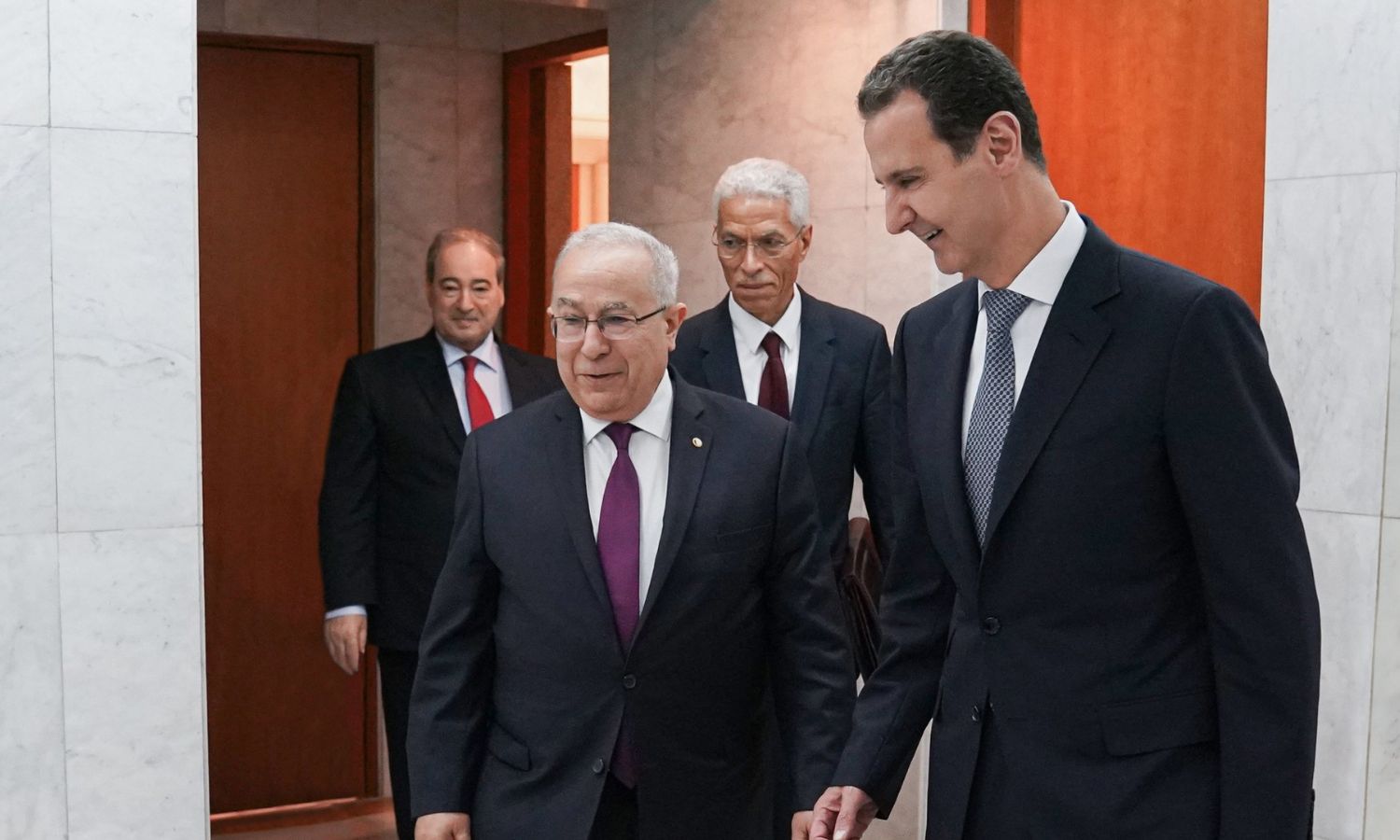
President of the Syrian regime Bashar al-Assad during his meeting with the Algerian Foreign Minister Ramtane Lamamra – 25 July 2022 (Syrian Presidency / Facebook)
US position?
The United States, which opposes opening channels with the Syrian regime, has not taken clear and visible steps towards the rapprochement of its allies with the regime, most notably the UAE, which broke al-Assad’s political isolation and granted him his first visit on 18 March to an Arab country since the outbreak of the 2011 Syrian revolution.
The US only condemned the visit on the same day through State Department spokesman Ned Price, who said according to the New York Times that Washington was “profoundly disappointed and troubled by this apparent attempt to legitimize Bashar al-Assad, who remains responsible and accountable for the death and suffering of countless Syrians, the displacement of more than half of the pre-war Syrian population and the arbitrary detention and disappearance of over 150,000 Syrian men, women, and children.”
The American Axios website, quoting two sources it described as well-informed, said that the Biden administration learned of the visit from the media, adding that White House and State Department officials were stunned.
On 15 March 2022, the US Republican and Democratic parties submitted a draft resolution tightening the screws on the Syrian regime with the aim of holding it accountable for its crimes against humanity, describing it as a “criminal backed by Russia and Iran.”
The project opposed the normalization of ties of any country with the Syrian regime and acknowledged the absence of a solution in Syria with the presence of the Syrian regime.
The US president called for not recognizing the Syrian government led by Bashar al-Assad, or any future elections in Syria under his leadership, in addition to forcefully imposing the Caesar Act for the Protection of Civilians in Syria of 2019, especially for government agencies that normalized their relations with the regime, and imposing a halt to the implementation of the Arab Gas Pipeline project and any other energy agreements that will provide the regime with gas and electricity.
At the beginning of the same month, the US embassy in Damascus published a tweet, through its official account on Twitter, in which it declared March “the month of accountability” and that impunity “will end” in Syria, but the issue did not go beyond the tweets.
Russian-Iranian alliance against Turkish threat
A split within the Astana axis?
The impact of the Astana peace talks since its launch in 2017, with other factors, was evident in drawing a new map of the areas of control in Syria by Turkey, Russia, and Iran, each according to its interests and directing the term “terrorism” in Syria.
Throughout the Astana talks over the past five years, 18 rounds were held, the most recent of which was last June, overshadowed by the military operation that Turkey threatens on its southern border with Syria, with which it targets the Syrian Democratic Forces (SDF), which it sees as an extension of the Kurdistan Workers’ Party (PKK) and classified as a terrorist on its lists.
While Russia and Iran are trying to achieve their own gains on the ground that intersect with the gains of the Syrian regime, which is supported by the two countries against the opposition factions backed by Turkey in northwestern Syria.
Iran fills the void
Iran was present in all conferences and political discussions on Syria, and in the recent Tehran summit, the talk focused on the military action that Turkey has been waging in Syria for several months, but it did not gain support due to the Russian-Iranian rejection.
Mustafa al-Nuaimi, an expert on Iranian affairs, considered that the recent Iranian leadership in the military and political files in Syria is “filling the Russian vacuum,”, especially in the event that this vacuum widens with the passage of time.
Al-Nuaimi explained, to Enab Baladi, that the political summit related to Syria was held in Tehran in particular because of the Russian support for Iran to increase its influence in this file, in preparation for the expansion of the vacuum left by Russia in the same file in the future.
Russia played a major role in increasing Tehran’s political and military influence in Syria by pushing Iran to try to “abort” the Turkish operation’s plan by playing the role of mediator between the regime forces and Turkey.
Heavy Iranian military deployment
Iranian ambitions in Syria are not limited to political gains that can be achieved from the Syrian file, as it has increased its military presence in various governorates over the past years, with the advance of the regime forces at the expense of the opposition factions and the Islamic State (IS) group from 2017 to 2020.
Last April, the Russian forces east of Homs handed over military depots in the desert area of Mahin, the second largest arms and ammunition depot in Syria, to the Lebanese Hezbollah militia and forces from the pro-Iran 4th Division, according to the Asharq al-Awsat newspaper.
The Russian move enabled Iran to annex new areas under its control, extending from the towns of Qalamoun, bordering Lebanon, to Deir Atiyah, Mahin, al-Qaryatayn, and al-Sukhnah, east of Homs, reaching the areas of Athriya in the eastern countryside of Hama and the oil fields in the south of al-Tabqa in the countryside of Raqqa governorate.
The foreign military bases deployed in Syria amounted to 753 sites until the middle of this year, including 469 Iranian military sites distributed among military, operational, and security sites, according to a study by the Jusoor Center for Studies.
The study also indicated that the Iranian forces were the most numerous among the foreign forces deployed in Syria during the first half of this year.
US and Turkey, the ally and enemy
The Russian-Turkish attraction in northwest Syria has played a role in changing the deployment and distribution of forces in Syria in recent years, especially in the southern countryside of Idlib and Aleppo governorates, which ended with the regime’s control of large areas in the region, such as the towns of Saraqib and Maarat al-Numan.
The assistant researcher at the Omran Center for Strategic Studies, Mohsen al-Mustafa, says that the American disengagement from the Syrian file at the military level during the past years cannot be considered an elimination of the control map since the US gave up northeastern regions of Ras al-Ain and Tel Abyad in favor of Turkey, while not giving up any areas for the benefit of Russia and Iran.
The fellow at the Tahrir Institute for Middle East Policies added to Enab Baladi that the Russian presence in northeastern Syria, whether through military patrols or some military points or sites, is not considered Russian control.
Al-Mustafa considered that the military conflict today has become “frozen,” as neither Russia nor Turkey seems to have any intention of violating the “de-escalation” agreement.
This stopped the military operations in northwest Syria, which prompted Turkey to search for a consensus with Russia to launch a military operation against the SDF to complete the establishment of a buffer zone, 30 kilometers deep along its borders inside Syria.
Friends’ sweet lies
Syria to where?
The political and military future in Syria remains ambiguous in the midst of the active political and military movement of the Astana axis, while America continues to ignore the Syrian file.
Burhan Ghalioun, a thinker and professor of contemporary political sociology at the French Sorbonne University, told Enab Baladi that “everything that has happened so far is a charade and a black joke to suggest the possibility of reaching a political solution.”
Ghalioun added that this was “in order to gain time and achieve the complete military victory that the regime has long sung about, and it has not stopped declaring its achievement once, second, and third time and at every intersection since its advisor, Buthaina Shaaban, announced that the matter is over or that the military operation will end within two months at most.”
White lie and impossible hope
Ghalioun believes that the Friends of Syria Group was also “a nice lie, as Westerners believed in the first months that al-Assad had inevitably fallen before the scale of the popular revolution and the determination of the Syrians and their endless sacrifices, but soon realized that their calculations were not accurate and that the intervention of Tehran and then Russia and their adoption of al-Assad’s victory at any cost, that is, even by destroying Syria and destroying its people, left them little room for maneuver.”
“The fulfillment of promises has become a serious engagement in the conflict that was not within their expectations, and therefore a high cost that they do not want or cannot provide and are not in their calculations, so they quietly withdrew, and then disappeared from the picture completely,” according to Ghalioun.
The Syrian thinker pointed out that the Astana talks were nothing but an unpalatable joke by which the Russians wanted to get the West out of the cycle of conflict in Syria, which the Westerners bought with their money.
“And they were not waiting for a better opportunity to withdraw their hands from the Holocaust, which the Syrians will bear alone.” They “accepted without discussion in the Constitutional Committee, to suggest to the Syrians that they still support them politically.”
As for “the Geneva Conference, it has been replaced by (Astana), and it is no longer for the Westerners and the Syrian opposition to recall the decisions of the Geneva Conference with any function or role, except to gain time without any bias and to justify retaining the salaries and positions that were born on its sidelines, and in the hope of its convening and the hope of this convening is what the Arabic saying applies to Satan’s hope for Paradise, unfortunately,” Ghalioun concludes.
if you think the article contain wrong information or you have additional details Send Correction
النسخة العربية من المقال
-
Follow us :
Most viewed
- Al-Hijri escalates against Damascus: A "radical" government
- Governor of As-Suwayda signs understanding agreement with al-Hijri: Key details unveiled
- Turkey confirms continuation of its operations in northeastern Syria
- Al-Sharaa signs draft constitutional declaration
- Kurdish rejection and international welcome for Syria’s constitutional declaration












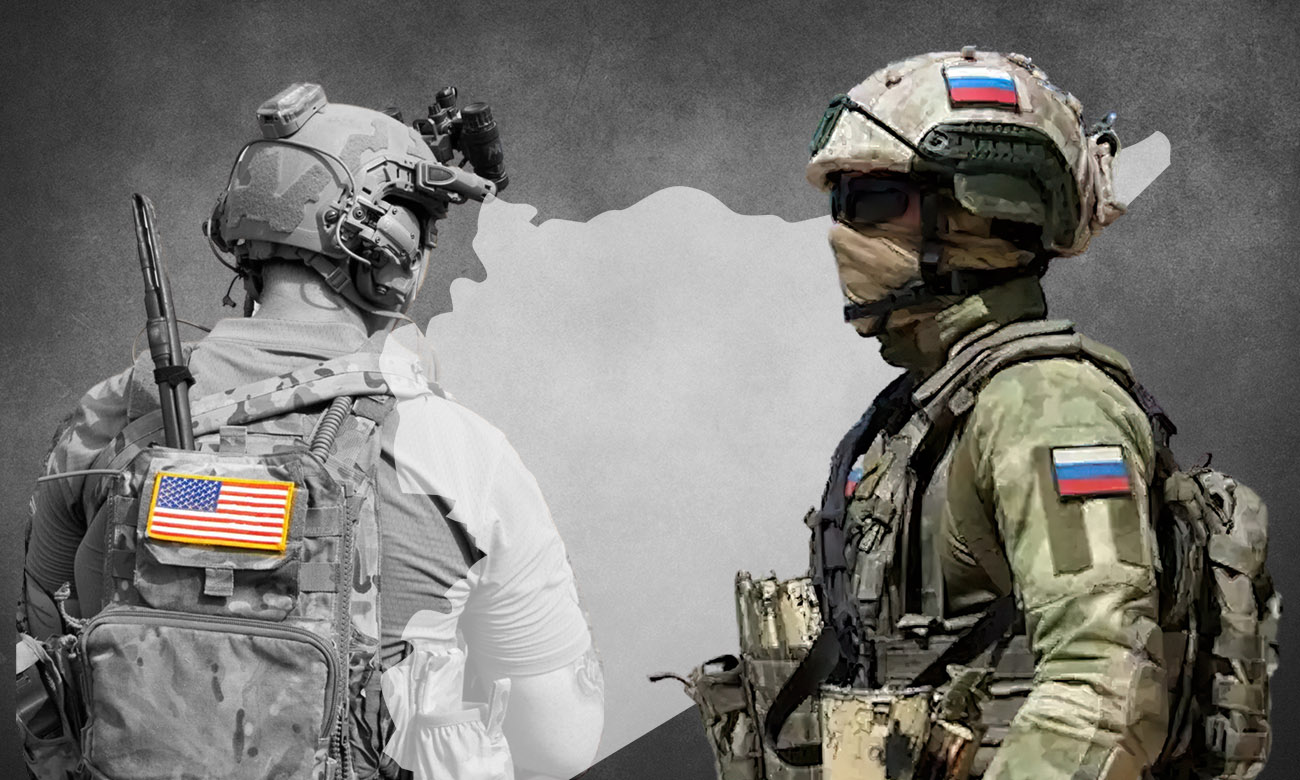
 A Russian soldier and an American soldier in Syria (edited by Enab Baladi)
A Russian soldier and an American soldier in Syria (edited by Enab Baladi)





 A
A
A
A
A
A
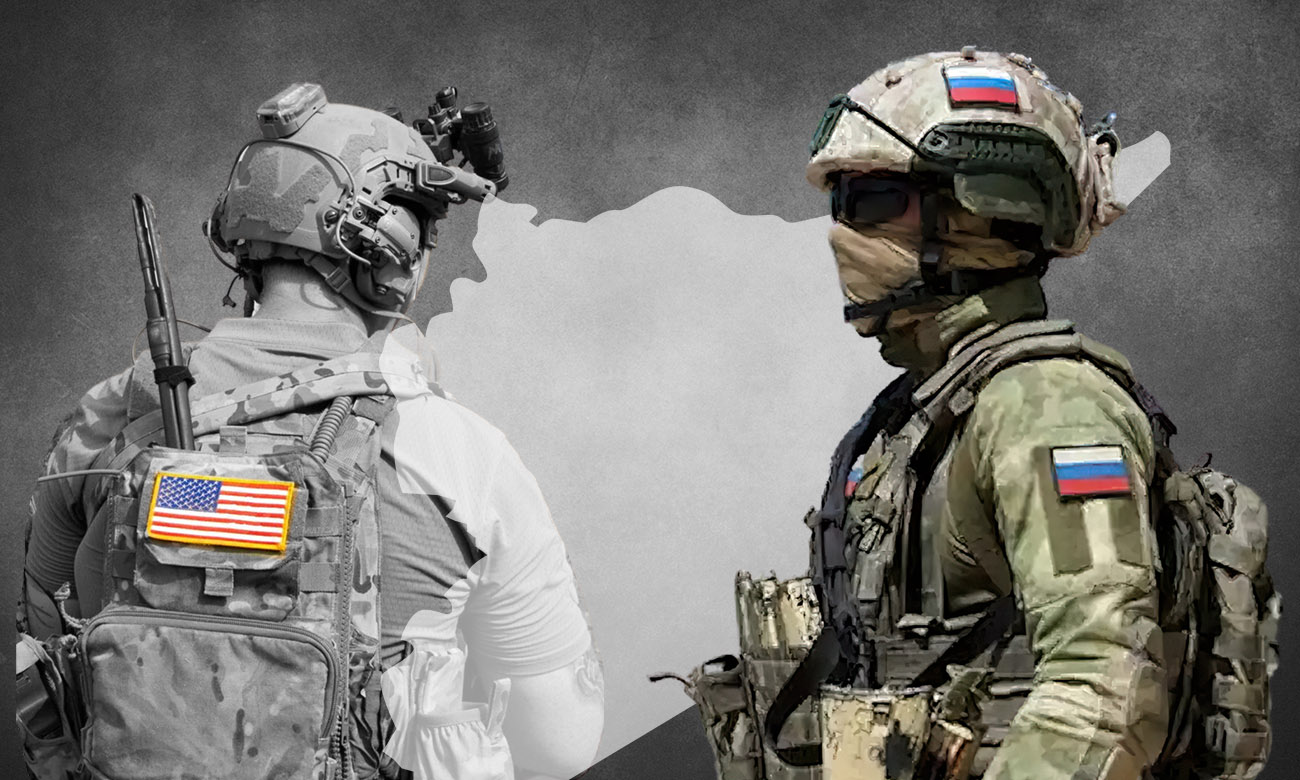
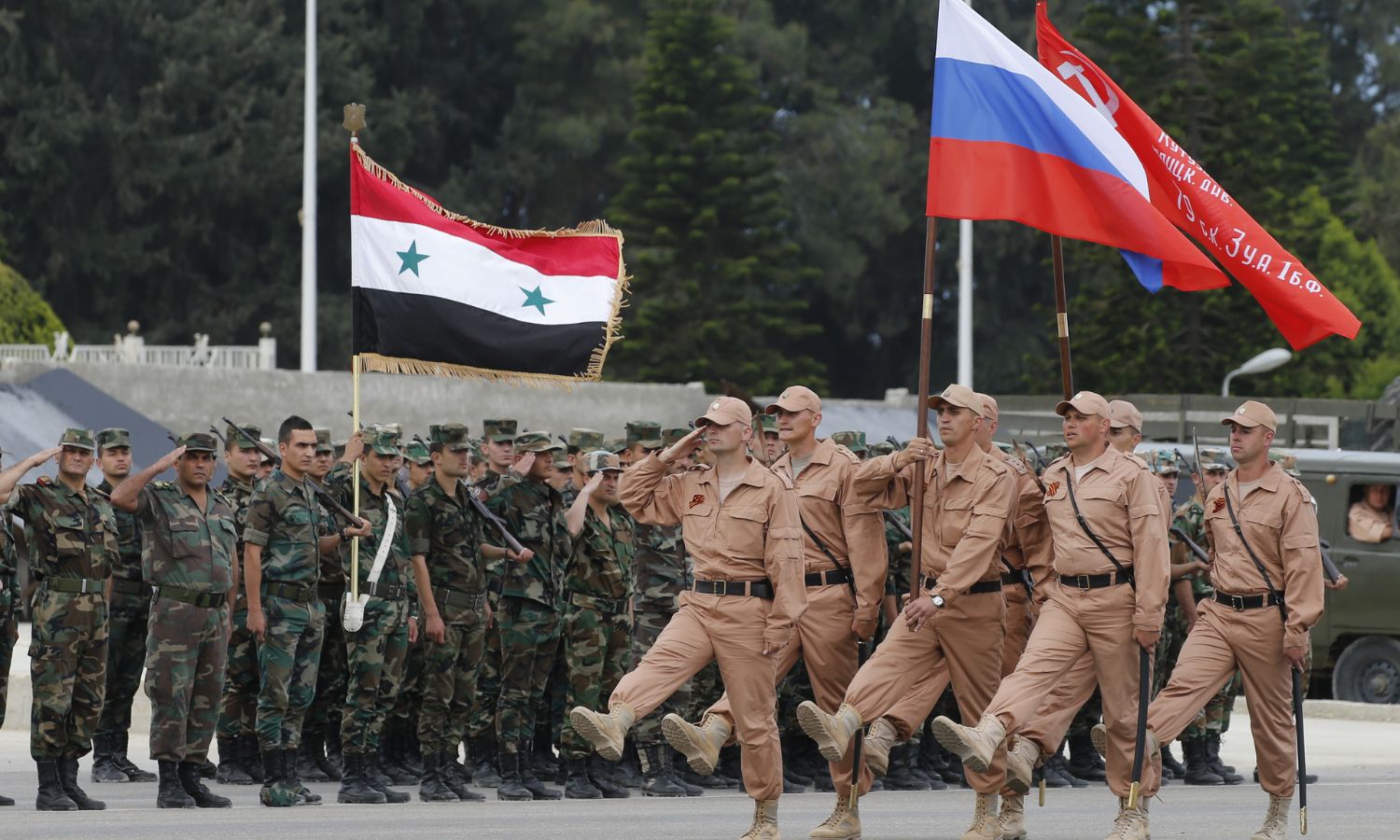
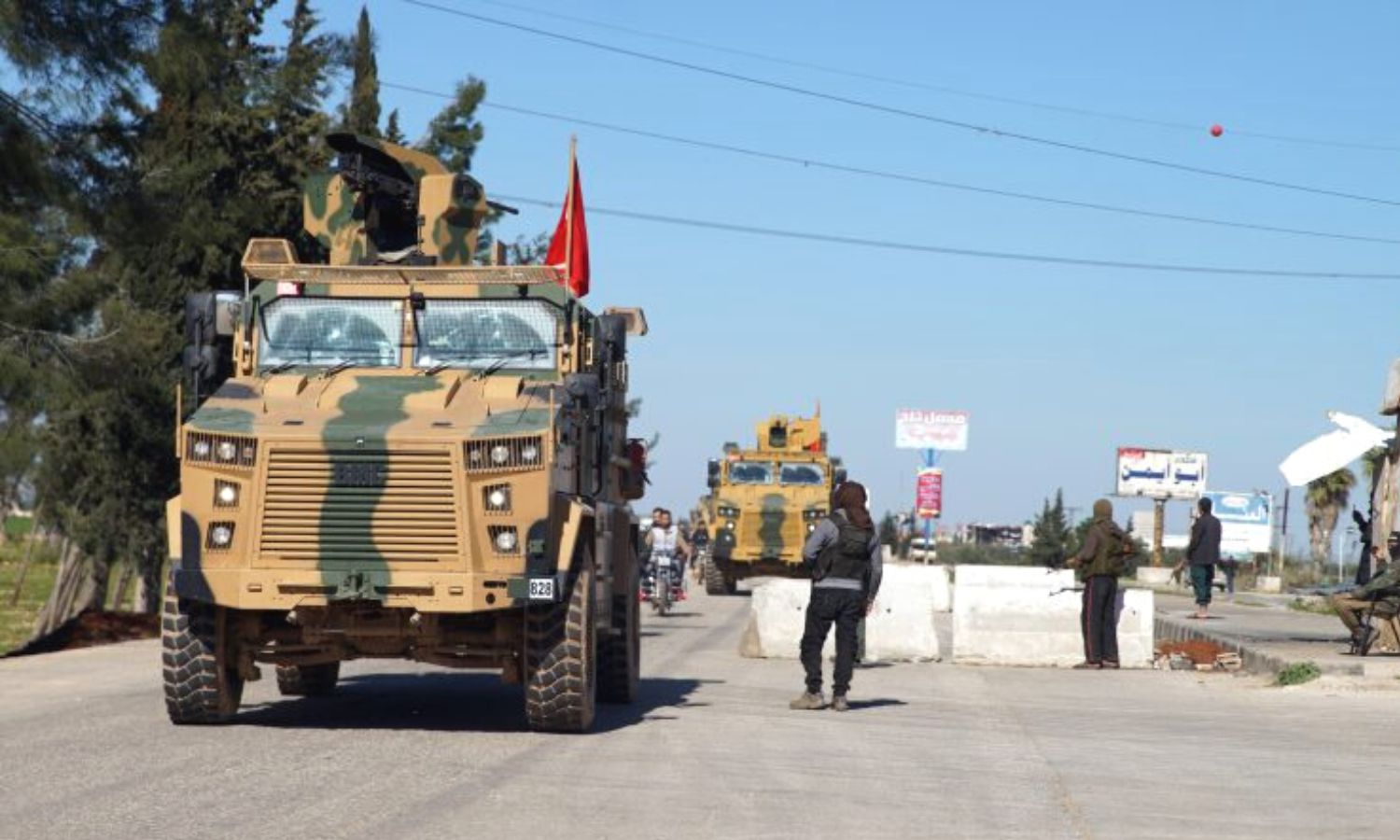



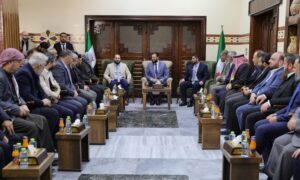
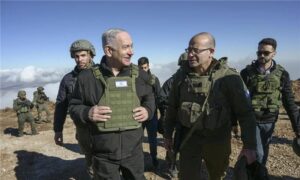
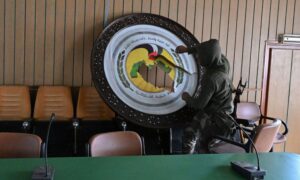
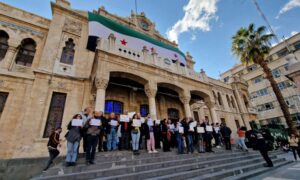
 More In-Depth
More In-Depth